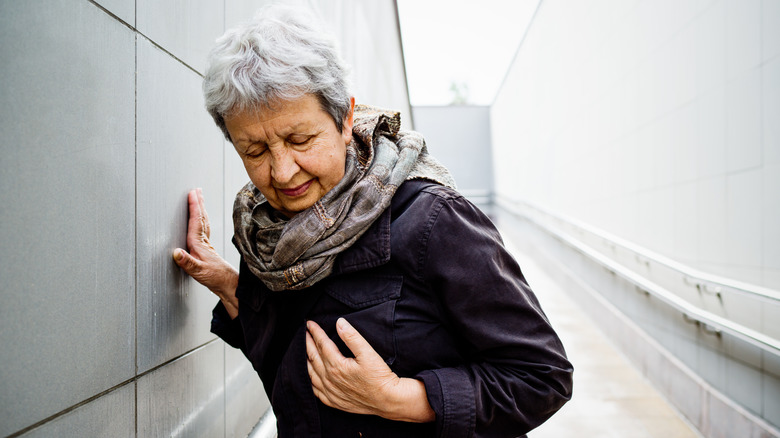What It Means If Chest Pain Comes And Goes
We've all been warned that we should never mess around with chest pain. Chest pain that comes on suddenly, sharply, or is accompanied by additional symptoms can be indicative of a cardiovascular event in need of immediate emergency intervention. According to Memorial Hospital of Gardena, more than 7 million people in the U.S. go to the emergency room for chest pain each year. But what if your chest pain isn't so abrupt? Instead, what if it seems to come and go in waves? Is it still worth a trip to the hospital?
Chest pain that intensifies and then subsides is sometimes more specifically related to muscle pain (via Medical News Today). Automobile accidents, failing to warm up prior to a workout, or improperly lifting something heavy can all lead to a strained muscle. However, one tell-tale sign of chest muscle pain is that the discomfort usually only worsens when moving around, breathing in sharply, or coughing. This differs from heart attack pain, which usually travels down the arm and is paired with additional symptoms.
Gastrointestinal health, breast-feeding, and mental health causes
Chest pain that ebbs and flows could alternatively mean that you're dealing with a gastrointestinal issue, reports Medical News Today. This can include ulcers, gallstones, or acid reflux. In cases of acid reflux, stomach acid that moves backwards into the throat (particularly following a meal or while sleeping) can make our chest feel like it's burning.
Another potential cause of chest pain that comes and goes is breast-feeding, particularly if an individual develops mastitis. Affecting the breast tissue, this common infection is characterized by pain and swelling in the chest area.
For some people, chest pain that comes in waves may be tied to their mental health. Sometimes mistaken for a heart attack, panic attacks can cause feelings of tightness or pressure in the chest. However, deep breathing exercises can often help reduce symptoms.
Alternatively, what about waves of chest pain that are localized to one specific area of the chest? Healthline explains that sharp, intermittent chest pain unique to the left side of the chest can sometimes be indicative of a hernia. According to the Cleveland Clinic, a hernia occurs when an internal organ protrudes through the surrounding muscle or tissue. Hernias are often seen in the groin, abdomen, or lower chest.
When waves of chest pain may be related to a heart issue
While there are still many other reasons why a person may experience chest pain that comes and goes, sometimes it is, in fact, linked to a heart issue. Those with a history of cardiovascular disease may be more prone to heart-related chest pain, which is why it's important to know the potential warning signs of a cardiovascular event.
For a heart attack, Medical News Today notes that this can include sudden, severe pain in the middle of the chest, feelings of intense pressure, pain that persists beyond several minutes, and the presence of additional symptoms, such as shortness of breath, nausea, or dizziness. Chest pain that gets better when massaged or with the use of pain-relief medications is not usually associated with a heart problem.
No matter what, when it comes to chest pain, it's always best to err on the side of caution. When going to the hospital, experts at Memorial Hospital of Gardena suggest patients be prepared to provide information regarding symptoms, duration or intensity of pain, medications, health status, family medical history, and more.



